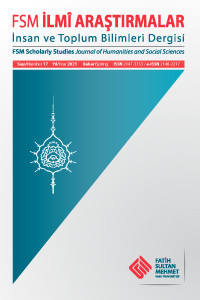Duygusal Zeka Ölçeği: Bir Ölçek Uyarlama Çalışması
Bu araştırmanın amacı Güney Kore’de Hyuneung Lee ve Yungjung Kwak1 tarafından2011’de geliştirilen Duygusal Zeka ölçeğini Türk diline uyarlayarak Türk kültürüneuygulamaktır. Araştırma 249 lise öğrencileri üzerinde uygulanmıştır. 20 maddeden oluşan3 boyutlu model doğrulayıcı faktör analizinde uyumlu bulunmuştur. Ölçeğin psikometriközelliklerini incelemek amacıyla iç tutarlılık, madde ve faktör analiz çalışmalarıyürütülmüştür. Güvenilirlik analizleri sonucunda ise ölçeğin tümü için Cronbach Alfakatsayısı .83 olarak bulunmuştur. Doğrulayıcı faktör analiz sonuçları ölçeğin 3 boyutlumodelinin Türk örneklemine uygun olduğu bulunmuştur (x²=399.55, df=167, RMSEA=.075, NNFI=.90,CFI=.91,IFI=.91,SRMR=.080, GFI=.86).Çalışma sonucunda, ölçekTürkiye’deki öğrencilerin eğitim süreçlerindeki duygusal zeka derecelerini ölçmedekullanılan bir araç olarak güvenilir ve geçerli bulunmuştur.
Anahtar Kelimeler:
Duygusal zeka, uyarlama, geçerlilik, güvenilirlik
Emotional Intelligence Scale: A Study of Scale Adaptation
The purpose of this study is to adaptation of Emotional Intelligence (EI) scale to theTurkish language. Research was implemented on the 249 high school students. The 3dimensional models which were consisted of 20 items were found coherent in the confirmatoryfactor analysis. Internal consistency, item and factor analysis studies were conductedfor the aim of examining psychometric features of the scale. The results of reliability ofthe scale analyses were .83, scale was found reliable. Confirmatory factor analysis’ resultsexhibit that scale’s original 3 dimensional models were appropriate for the Turkish sample(x²=399.55, df=167, RMSEA=.075, NNFI=.90, CFI=.91, IFI=.91, SRMR=.080, GFI=.86).In this case, scale is considered as a reliable and valid instrument in terms of measuringlearners’ emotional intelligence degree in the education process of learners in Turkey.
Keywords:
Emotional intelligence, adaptation, validity, reliability,
___
- Furr, R, M., & Bacharach, V.R., Psychometric: An Introduction, Thousand Oaks, CA, Sage Organizational Research Methods, 14 (3), 2008.
- ISSN: 2147-3153
- Başlangıç: 2012
- Yayıncı: Fatih Sultan Mehmet Vakıf Üniversitesi
Sayıdaki Diğer Makaleler
Burhanettin DURAN, Cemil AYDIN, Çeviren Demet KOÇYİĞİT
Abdülcelîl b. Mollâ Cemîl ve Nasîhatü’l-Mülûk Tercümesi Üzerine
Türkiye’de Türk Sosyoloji Tarihi Üzerine Yapılmış Çalışmalar - Bibliyografya ve Değerlendirme -
İsmail Küçükkılınç, Jön Türklük ve Kemalizm Kıskacında İttihadçılık
“Psikoloji Günleri, Nöropsikoloji”
Duygusal Zeka Ölçeği: Bir Ölçek Uyarlama Çalışması
Şehri Nur KAYIHAN, Serhat ARSLAN
Hicret-i Nebî’nin Klasik Türk Şiirine Yansıması
Eugene Boré ve Katolik Vincentian Cemaati’nin Yakındoğu’da Kurduğu Misyoner Merkezleri
